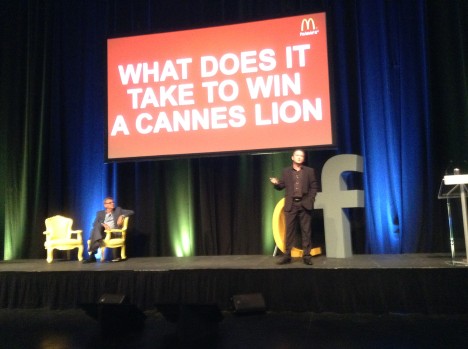McDonald’s CMO Lollback: Questioning our Press Lions win is tall poppy syndrome
McDonald’s chief marketing officer Mark Lollback has claimed “tall poppy syndrome” is the reason questions have been raised about the brand’s Lions-winning print campaign which only ran in one local paper.
Commenting publicly for the first time on the ‘Big Mac Legends’ press campaign, Lollback claimed it was a “test” when it ran in the cheapest publication in the News Local group, The Rouse Hill Times.
Lollback’s comments came after a joint presentation with Cannes Lions chairman Terry Savage at yesterday’s Creative Fuel conference entitled “What does it take to win a Cannes Lion”.



There’s as much meat in his answer as in their patties.
One from the Charlie Sheen manual of handling bad PR – correctly assume that there is no such thing as bad PR. Point out that you feel no shame even though the vast majority of people thinking you should and ignore the fuss.
Tall poppy syndrome tends to focus on people who have been successful – positioning a bronze in print as a success is both a stretch and a convenient strategy to try and deflect the stench of scam.
The media strategy is the one thing we want more information on. In any non scam campaign the media represents a large percentage of the overall budget and is critical for a campaigns success so it would be good to hear about the strategy and why Rouse Hill was selected and also more details on the outdoor and radio placements would be good as it would help to demystify the campaign.
Did anyone ask him whether McDonalds plans to continue running more of these ad campaigns with invisible Golden Arches?
You got the answer you deserved.
“Look we’ve got fantastic talent here, let’s celebrate it. Let’s get behind the talent that sits in the agencies here in Australia, that’s all I would say.”
Then run the work widely Mark.
Just for a change, bring out the ‘tall poppy syndrome’ defence.
I have to agree that ‘Tall Poppy Syndrome’ is a thoroughly crap rebuke to very valid questions around integrity and fair play.
But anyway, this isn’t really about McDonalds. The issue lies with Cannes and its rules. As long as it is open to entries that can be run once in a local rag to qualify, agencies (and clients) will continue to submit based on these terms.
Tall Poppy syndrome? Poppycock. Scam ads are weeds and need to be weeded out.
Hi Mark,
It’s not a very good look just staring down the barrel and lying like that.
The best response in this whole thing has been Mat Baxter’s.
Just be honest all.
Surely if you want to “get behind the talent that sits in the agencies here in Australia” then you’d get behind the creative and give it a proper run.
No better way to say “this is not a scam” than on the same stage as the guy who runs the awards. I’m enjoying this Kafkaesque farce. Keep at ’em!
What a bunch of arse
The ego has landed
Leaders who start a sentence with “Look…” actually want us to look the other way.
Great to see mUmbrella continue to take a long hard ‘look’ at this issue.
The calibre and integrity being demonstrated by Mumbrella is in sharp and disappointing contrast to the doubtful ethics displayed by the parties complicite in these ad “campaigns”. Full respect to Mumbrella and its editorial independence. I know from my days in the MSM that by now the “mates” and “old boyz” network would have well and truly cut in. A discrete lunch here, a word there, and a disappearing of the issue as “not news”. Here we see it IS news – and something that those within the industry are very much interested in. Thanks Mumbrella.
Can’t discuss media strategies.
Oh yeah, they are super secret because it’s not like people can work them out by simply seeing your messaging in market. What a ridiculous response from a suposedly seasoned marketer. Embarrasing
Mark?!? Wtf?
‘For McDonalds, we’ve seen ROI 54% higher with creative that wins Lions than creative that doesn’t.’
– Matt Biespiel, Global Brand Development, McDonalds Corporation.
Quoted on the Cannes Lions website.
Which explains why you hid this in the Rouse Hill Times while you continue to feed us rubbish in your mainstream campaigns. It’s not tall poppy syndrome, Mark, its zero tolerance of hypocrisy.
Ad which meets awards criteria wins award.
What a f*+#@ing shite unbranded ad.
Seriously, are we still talking about this?
Agencies/advertisers “only just” playing by the rules to win shiny things… yawn.
If you’re that concerned about the guidelines of the awards, take it up with Cannes.
This is the equivalent of buying your first drink on your 18th Birthday and having the barman say “yes but you’re only just 18”